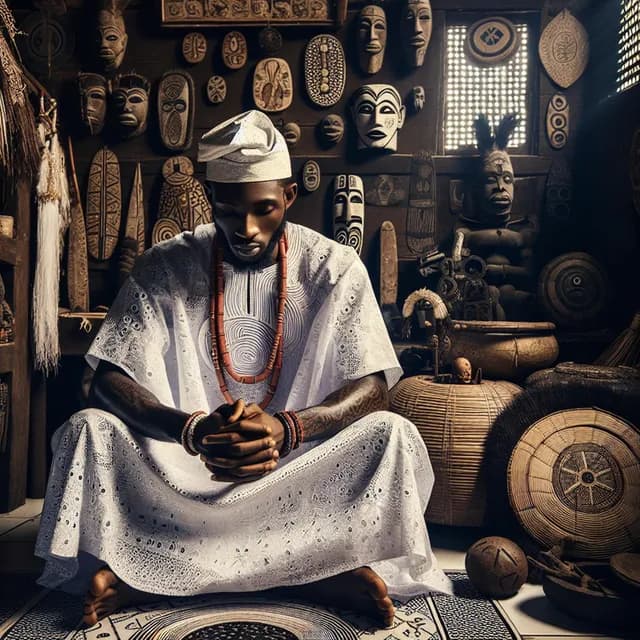Meaning of Babalawo

Published on:
The Yoruba culture, originating from the Yoruba people of Nigeria, is a profound tapestry woven with spirituality, tradition, and communal identity. At the heart of this rich cultural heritage are the Babalawos, the learned priests of the Ifá divination system. These spiritual leaders hold an esteemed position, bridging the human experience with the divine, offering insights into the unseen, and preserving the Yoruba worldview through their practice and teachings.
The Role of a Babalawo
Babalawos are more than religious figures; they are vital custodians of Yoruba wisdom and tradition. These priests possess extensive knowledge of the Ifá literary corpus, which is essential in guiding individuals through life’s complexities. Their influence extends from spiritual advisement to ritual leadership, promoting harmony between people and the cosmos.
The journey to becoming a Babalawo is a rigorous endeavor. Aspirants undergo extensive training under the mentorship of established Babalawos, learning to memorize thousands of Ifá verses, interpret divination signs, and understand the philosophical underpinnings of Yoruba spirituality. The initiation process often includes a symbolic death and rebirth, signifying the individual's new spiritual responsibilities and commitment to serving the community with integrity.
A Babalawo’s duties are diverse and profound. They conduct divination rituals to uncover guidance from Orunmila, the deity of wisdom, using sacred tools like the opele chain or ikin nuts. The insights offered can range from advising on personal dilemmas to making significant community decisions, illustrating the Babalawo’s vital role in maintaining societal equilibrium.
Ifá Divination
Ifá divination is a sophisticated and deeply esteemed practice that encapsulates the theology, cosmology, and philosophy of the Yoruba people. The system is structured around 256 odu, or chapters, each containing a multitude of verses and interpretations that address every aspect of human life and the universe. This vast repository of knowledge is central to the practice of Ifá.
The divination process involves intricate rituals where a Babalawo communicates with the divine to receive wisdom and solutions for earthly matters. The opele chain or ikin nuts are cast, and the resulting patterns are interpreted according to the odu. This process not only sheds light on immediate concerns but also defines an individual's spiritual trajectory, offering a map for navigating life’s journey in alignment with their destiny.
This divination is not just a predictive tool but also a means of spiritual alignment. It aligns the supplicant’s inner world with the universal order, mitigating misfortunes and enhancing the flow of ashe, the life force. The teachings of Ifá emphasize a balanced life, encouraging individuals to live in harmony with themselves, others, and nature.
The Duality of the Babalawo's Role
While Babalawos are predominantly recognized for their benevolent guidance, the dual nature of their influence cannot be overlooked. Some Babalawos engage in practices that exploit their spiritual authority for personal gain or the fulfillment of clients' unscrupulous desires, such as casting harmful spells or accumulating wealth through unjust means.
This darker aspect of the Babalawo’s role underscores the significant power they hold—and the potential for its misuse. Such practices often arise from societal pressures or individuals seeking to manipulate spiritual forces for earthly benefits, diverging from Ifá’s principal teachings of justice, fate, and ethical behavior.
Understanding this duality is essential for appreciating the gravity and ethical complexity of the Babalawo's role within Yoruba society. It highlights the constant need for spiritual leaders to uphold integrity, guiding their communities with respect to ancestral wisdom and ethical codes.
Cultural Importance of Ifá in Yoruba Religion
Ifá is more than a divination practice; it is a comprehensive repository of Yoruba religion and thought, capturing the essence of their spiritual and moral universes. Through Ifá, the Yoruba people maintain a deep connection with their deities, ancestors, and the natural world, ensuring the cultural and spiritual continuity that has sustained them across generations.
This divination system plays a key role in reinforcing societal norms and values, serving as an educational tool that communicates vital lessons about life, morality, and cultural identity. The odu of Ifá are rich in parables and proverbs that convey Yoruba philosophical thought and cultural ethos. In this way, Ifá serves as a living archive of Yoruba wisdom, philosophy, and ethics, passed down orally through generations.
The Global Influence of Yoruba Practices
The reach of Yoruba religion and culture extends far beyond Nigeria, significantly influencing spiritual practices throughout the diaspora, particularly in the Americas and the Caribbean. Religions such as Santería in Cuba, Candomblé in Brazil, and Vodou in Haiti all bear the imprint of Yoruba traditions, adapting Ifá wisdom and Yoruba deities, known as orishas, within their rituals and beliefs.
In the contemporary world, there is a growing resurgence in the interest and practice of traditional African religions, including Ifá. This increase in global awareness has seen Yoruba practices gain recognition and respect, not only as religious systems but also as vital elements of cultural diversity and heritage.
However, this global spread also necessitates careful navigation between cultural exchange and appropriation. As more individuals from different backgrounds engage with Yoruba practices, there is an onus on maintaining respect for their origins and significance, ensuring these traditions are honored with the reverence they deserve.
Conclusion
The role of the Babalawo and the Ifá divination system are critical to understanding the depth and breadth of Yoruba culture and spiritual life. As stewards of ancient wisdom, Babalawos maintain the intricate balance between the earthly and the divine, serving as essential pillars that uphold Yoruba traditions and spiritual teachings.
As modern interest in Yoruba practices continues to expand, it is crucial to remain mindful of the cultural significance and historical context from which these traditions arise. By doing so, we honor the legacy of the Ifá and the Babalawos, ensuring that their wisdom continues to illuminate pathways not only for the Yoruba people but for all those who seek spiritual insight and understanding.